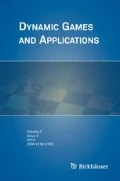Abstract
We study the ergodicity of deterministic two-person zero-sum differential games. This property is defined by the uniform convergence to a constant of either the infinite-horizon discounted value as the discount factor tends to zero, or equivalently, the averaged finite-horizon value as the time goes to infinity. We provide necessary and sufficient conditions for the unique ergodicity of a game. This notion extends the classical one for dynamical systems, namely when ergodicity holds with any (suitable) perturbation of the running payoff function. Our main condition is symmetric between the two players and involve dominions, i.e., subsets of states that one player can make approximately invariant.

Similar content being viewed by others
Notes
We refer the reader to [2, Sec. 6.1] for the connections between classical ergodic theory and ergodicity of games or Hamiltonians.
In order to simplify the notation, we shall equally denote by a and b single elements of A and B, respectively, and controls of player 1 and player 2, i.e., elements of \({\mathscr {A}}\) and \({\mathscr {B}}\), respectively. The distinction should be clear from the context.
We recall that a modulus of continuity is a nondecreasing function \(\omega : [0,+\infty ) \rightarrow [0,+\infty )\), vanishing and continuous at 0, that is, such that \(\lim _{r \rightarrow 0} \omega (r) = \omega (0) = 0\).
In this paper, the solutions of PDEs will always be in the continuous viscosity sense.
We mention that the notion of discriminating/leadership domain, hence of dominion, relates with the ones of B-set and approachability in repeated games with vector payoffs. Indeed, In [7], As Soulaimani, Quincampoix and Sorin proved that the B-sets for one player (which provide a sufficient condition for approachability) coincide with the discriminating domains for that player in an associated differential game.
References
Akian M, Gaubert S, Hochart A (2020) A game theory approach to the existence and uniqueness of nonlinear Perron–Frobenius eigenvectors. Discrete Contin Dyn Syst 40(1):207–231. https://doi.org/10.3934/dcds.2020009
Alvarez O, Bardi M (2003) Singular perturbations of nonlinear degenerate parabolic PDEs: a general convergence result. Arch Ration Mech Anal 170(1):17–61. https://doi.org/10.1007/s00205-003-0266-5
Alvarez O, Bardi M (2007) Ergodic problems in differential games. In: Advances in dynamic game theory. Annals of the international society of dynamic games, vol 9. Birkhäuser, pp 131–152. https://doi.org/10.1007/978-0-8176-4553-3_7
Alvarez O, Bardi M (2010) Ergodicity, stabilization, and singular perturbations for Bellman–Isaacs equations. Mem Am Math Soc 204(960):vi+77. https://doi.org/10.1090/S0065-9266-09-00588-2
Arisawa M (1997) Ergodic problem for the Hamilton–Jacobi–Bellman equation. I. Existence of the ergodic attractor. Ann Inst H Poincaré Anal Non Linéaire 14(4):415–438. https://doi.org/10.1016/S0294-1449(97)80134-5
Arisawa M (1998) Ergodic problem for the Hamilton–Jacobi–Bellman equation. II. Ann Inst H Poincaré Anal Non Linéaire 15(1):1–24. https://doi.org/10.1016/S0294-1449(99)80019-5
As Soulaimani S, Quincampoix M, Sorin S (2009) Repeated games and qualitative differential games: approachability and comparison of strategies. SIAM J Control Optim 48(4):2461–2479. https://doi.org/10.1137/090749098
Aubin JP, Frankowska H (2009) Set-valued analysis. Modern Birkhäuser classics. Birkhäuser, Boston. https://doi.org/10.1007/978-0-8176-4848-0. Reprint of the 1990 edition
Bardi M, Capuzzo-Dolcetta I (1997) Optimal control and viscosity solutions of Hamilton–Jacobi–Bellman equations. Systems & control: foundations & applications. Birkhäuser, Boston. https://doi.org/10.1007/978-0-8176-4755-1
Bettiol P (2005) On ergodic problem for Hamilton–Jacobi–Isaacs equations. ESAIM Control Optim Calc Var 11(4):522–541. https://doi.org/10.1051/cocv:2005021
Buckdahn R, Quincampoix M, Renault J (2015) On representation formulas for long run averaging optimal control problem. J Differ Equ 259(11):5554–5581. https://doi.org/10.1016/j.jde.2015.06.039
Cannarsa P, Quincampoix M (2015) Vanishing discount limit and nonexpansive optimal control and differential games. SIAM J Control Optim 53(4):1789–1814. https://doi.org/10.1137/130945429
Cardaliaguet P (1996) A differential game with two players and one target. SIAM J Control Optim 34(4):1441–1460. https://doi.org/10.1137/S036301299427223X
Cardaliaguet P (2010) Ergodicity of Hamilton–Jacobi equations with a noncoercive nonconvex Hamiltonian in \(\mathbb{R}^2/\mathbb{Z}^2\). Ann Inst H Poincaré Anal Non Linéaire 27(3):837–856. https://doi.org/10.1016/j.anihpc.2009.11.015
Gaitsgory V, Quincampoix M (2013) On sets of occupational measures generated by a deterministic control system on an infinite time horizon. Nonlinear Anal 88:27–41. https://doi.org/10.1016/j.na.2013.03.015
Hochart A (2019) An accretive operator approach to ergodic zero-sum stochastic games. J Dyn Games 6(1):27–51. https://doi.org/10.3934/jdg.2019003
Khlopin D (2018) Tauberian theorem for value functions. Dyn Games Appl 8(2):401–422. https://doi.org/10.1007/s13235-017-0227-5
Lions PL, Papanicolaou G, Varadhan SRS (1987) Homogenization of Hamilton–Jacobi equations. Unpublished work
Quincampoix M, Renault J (2011) On the existence of a limit value in some nonexpansive optimal control problems. SIAM J Control Optim 49(5):2118–2132. https://doi.org/10.1137/090756818
Vigeral G (2013) A zero-zum stochastic game with compact action sets and no asymptotic value. Dyn Games Appl 3(2):172–186. https://doi.org/10.1007/s13235-013-0073-z
Ziliotto B (2016) Zero-sum repeated games: counterexamples to the existence of the asymptotic value and the conjecture \({\rm maxmin}=\lim v_n\). Ann Probab 44(2):1107–1133. https://doi.org/10.1214/14-AOP997
Ziliotto B (2017) Stochastic homogenization of nonconvex Hamilton–Jacobi equations: a counterexample. Commun Pure Appl Math 70(9):1798–1809. https://doi.org/10.1002/cpa.21674
Ziliotto B (2019) Convergence of the solutions of the discounted Hamilton–Jacobi equation: a counterexample. J Math Pures Appl 9(128):330–338. https://doi.org/10.1016/j.matpur.2019.04.005
Author information
Authors and Affiliations
Corresponding author
Additional information
Publisher's Note
Springer Nature remains neutral with regard to jurisdictional claims in published maps and institutional affiliations.
The author is supported by FONDECYT Grant 3180662.
Rights and permissions
About this article
Cite this article
Hochart, A. Unique Ergodicity of Deterministic Zero-Sum Differential Games. Dyn Games Appl 11, 109–136 (2021). https://doi.org/10.1007/s13235-020-00355-y
Published:
Issue Date:
DOI: https://doi.org/10.1007/s13235-020-00355-y



